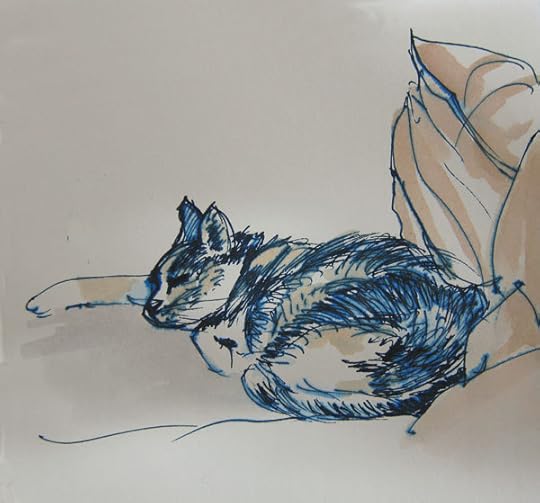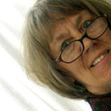Drawing Oneself with a Pen
Once at Bar-le-Duc Montaigne saw a portrait which René, King of Spain, had painted of himself and asked, "Why is it not, in like manner, lawful for everyone to draw himself with a pen, as he did with a crayon?" Off-hand one might reply, not only is it lawful, but nothing could be easier. Other people may evade us, but our own features are almost too familiar. Let us begin. And then, when we attempt the task, the pen falls from our fingers; it is a matter of profound, mysterious, and overwhelming difficulty.
After all, in the whole of literature, how many people have succeeded in drawing themselves with a pen?
Virginia Woolf, The Common Reader: First Series, "Montaigne."
This drawing seems like something Montaigne might have done, if he had taken up his pen and drawn his cat.
--Teju Cole, in a note to me
But this talking of oneself, following one's own vagaries, giving the whole map, weight, colour, and circumference of the soul in its confusion, its variety, its imperfection -- this art belonged to one man only: to Montaigne.
--Virginia Woolf, The Common Reader: First Series, "Montaigne."
I've read very little Montaigne, and once I'm finished with this book of Virginia Woolf's essays on writers, perhaps I should. What she says about him intrigues me -- the writer who looks inward to try to find the truth -- as it obviously intrigued her, being a woman of a similar bent. What she describes is not a morbid or narcissistic preoccupation, but rather a sense that this is the place to begin: that if we can't know ourselves, if we even refuse to really look, how can we know anything about other people and the world?
And I like the analogy between writing and drawing, since actual drawing is one way I've always tried to look more closely. Virginia Woolf, such a close friend of the visual artists in the Bloomsbury Group, must have talked at length with the others about the path of searching-out, whether in words or in paint. But there's a paradox. When I was young, I thought that the closer I captured the details, the closer I was getting to the real thing. Oddly, the world sometimes seems to think so too, and many artists and writers stay there as a result.
But the essence of a landscape, a person, or a feeling can't be added up out of small parts, like a sum. We're more likely to glimpse it -- that essence, that truth -- out of the corner of our eye, or reflected darkly in a mirror, or to come to it after writing pages and pages that circle around this unseen "it-ness" like hungry lions moving in the forest around a bright but dangerous campfire.
Montaigne...refused to teach, refused to preach; he kept on saying that he was just like other people. All his effort was to communicate, to write himself down, to tell the truth, 'and that is a rugged road, more than it seems.'
For beyond the difficulty of communicating oneself, there is the supreme difficulty of being oneself.
--Virginia Woolf




